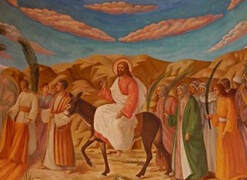 Advent 1 Matthew 21:1–9 December 1, 2019 St. John’s Lutheran Church—Chicago, IL In the name of + Jesus. Only Christianity can have a season called Advent. In every other religious scheme, any other god demands that the movement be from you to him. You must approach him with your works, your sacrifices, your offerings. You must ascend to the heights to bridge earth and heaven. If you do not take the initiative, those gods will not be moved. Even worse, they may be irritated or enraged if you don’t come to them or if you don’t come to them in the right way. In other religious schemes, you have to seek god, as if he’s playing hard to get. A decade or so ago it was fashionable to have a “seeker-sensitive” service, which presumed there are masses of people out there poking around looking for god like some sort of spiritual scavenger hunt. But a god who makes you come looking for him is not going to be a gracious god. He may not be irritated or enraged, but he is probably indifferent. If you have to go looking for god, then there is something else that demands more of his attention than you do. The third scheme is much more prevalent than the first two. It’s when you realize that the god whom you seek is actually inside of you—that he’s actually you. This is the oldest sin in the book; the serpent tempted Eve and Adam that they could be like God, which was simply to tempt them to be gods unto themselves. The name that Martin Luther gave this delusion of grandeur is enthusiasm. Not that you’re really excited about something, but that you’ve located god inside yourself. It’s self-pride. Self-righteousness. The movement is turned completely inward and divorced from His Word. Advent means to come. In this season we celebrating and adventing God. He does not demand us to come to Him; He does not play hide and seek; He does not burrow into your inner being. He comes. But to say that God comes is also to say that He speaks. These two acts are woven together inseparably: God comes to speak. It’s His first act after Adam and Eve failed to become like gods by looking for God apart from His Word: And they heard the sound of the Lord God walking in the garden in the cool of the day, and the man and his wife hid themselves from the presence of the Lord God among the trees of the garden. But the Lord God called to the man and said to him, “Where are you?” (Gen 3:8–9). That question, “Where are you?” has been the source of much discussion and speculation, but God would have never even uttered those words if He had not first come to the freshly minted sinners as they were hiding in the garden. God is the one who seeks the sinner. Those words echo throughout history and enter your ears, too. “Where are you?” Where have you gone so that God must come to you? The answer to that question is to look at where God must go. The prophet says, “Say to the daughter of Zion, ‘Behold, your king is coming to you, humble, and mounted on a donkey, and on a colt, the foal of a beast of burden.’” This oracle is put into its proper context when Jesus commissions His disciples to get a donkey from outside Jerusalem for Him to ride into the city. Behold, your king is coming to you. His first Advent is peculiar and unexpected. Although there are some other instances in history of a powerful king riding on a donkey, the emphasis is certainly not on wielding that power. Behold, your king is coming to you, humble. This humility is because the donkey is not the only one who bears a burden. Upon the donkey sits the Lamb, who bears the sin of a world. His destination is the cross. This is where the question, “Where are you?” leads. There is where Jesus must go. Now this was the feast of the Passover. Recall that the Passover feast began with the day of Passover followed by a weeklong feast of Unleavened Bread. It’s a bit like Christmas in the Church year. Christmas isn’t done on Dec. 25, but we celebrate for 12 days. Passover hadn’t quite come yet when Jesus comes into Jerusalem, but in a very similar way that we start singing Christmas carols and decorating weeks in advance of Christmas in anticipation of the feast of Jesus’ nativity, the people who were going to Jerusalem were already singing the hymns of Passover as they were going up to the feast. The Hallel Psalms, which is comprised of Psalms 113–118, are the Psalms appointed for the great pilgrim festivals. There is little doubt that when St. Matthew reports that Jesus and the disciples sang a song after the Passover meal before heading to the Mount of Olives, they were singing the Hallel Psalms. They were as necessary to Passover as Silent Night and Joy to the World are to Christmas. These Psalms conclude: [Hosanna], O Lord! O Lord, we pray, give us success! Blessed is he who comes in the name of the Lord! We bless you from the house of the Lord. The Lord is God, and he has made his light to shine upon us. Bind the festal sacrifice with cords, up to the horns of the altar! (Ps 118:25–27). And the crowds that went before him and that followed him were shouting, “Hosanna to the Son of David! Blessed is he who comes in the name of the Lord! Hosanna in the highest!” (v 9). The unique season of Advent is possible only because we have a God who comes in such a peculiar and concrete way. Blessed is He who comes in the name of the Lord. The children who sang the Passover hymn didn’t know it at the time, but the one who rode into Jerusalem not only comes in the name of the Lord, His name is the Lord. He is God come in the flesh, in humility. He is the God who comes to us, to where we are, to die. He is the God who comes rise from the dead, and to save. The name Jesus means, “The Lord saves.” Advent is also a season to recall that Jesus not only came once upon a time, but that He is the coming God. He makes the pilgrimage again and again, to come to you, to bring you salvation. The Passover hymn is also our hymn at every Lord’s Supper--Hosanna, hosanna, hosanna in the highest; blessed is He who comes in the name of the Lord. Hosanna in the highest. You also bear the name of the Lord—not as your given name or your family name, but your adopted name. The name was put on you when you were baptized. In the water, God came to you, to where you are, to deliver His salvation. Where you go, the name of the Lord is with you. And that means that the Lord is with you. Blessed Is He Who Comes in the + Name of the Lord Jacob W Ehrhard VD+MA If you benefited from this devotion and would like to support the ongoing ministry of St. John's Lutheran Church and School, click below to make a one-time or recurring contribution through our secure giving page.
0 Comments
Your comment will be posted after it is approved.
Leave a Reply. |
BlogCategories
All
SearchArchives
July 2024
|
